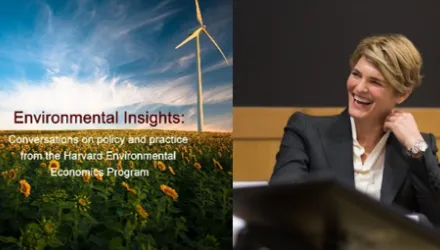A big beat grows more challenging and complex
Media coverage of climate change is at a crossroads, as it moves beyond the science of global warming into the broader arena of what governments, entrepreneurs, and ordinary citizens are doing about it. Consider these recent examples: a decade from now, Abu Dhabi hopes to have the first city in the world with zero carbon emissions. In a windswept stretch of desert, developers plan to build Masdar City, a livable environment for fifty thousand people that relies entirely on solar power and other renewable energy. Science correspondent Joe Palca reported from Masdar’s construction site as part of National Public Radio’s yearlong project “Climate Connections.”
The Christian Science Monitor’s Peter N. Spotts went to the Biesbosch, a small inland delta near the Netherlands’ city of Dordrecht, to research “How to Fight a Rising Sea.” In an effort that could be instructive for others, the Dutch are developing ways to protect their small country’s vulnerable coast against rising sea levels that could result from climate change.
Wang Suya lives in Japan but sends a YouTube greeting to fellow visitors at Dot Earth, the innovative blog started by Andrew C. Revkin, the New York Times environment reporter. Having traveled the globe to cover global warming, Revkin now posts and exchanges ideas on Dot Earth about climate and sustainability issues, particularly the energy, food, and water demands on a planet that may house nine billion people by mid-century.
These reporters are in the advance guard of an army of journalists around the world who are covering what Time magazine has dubbed the “War on Global Warming.” Journalists will play a key role in shaping the information that opinion leaders and the public use to judge the urgency of climate change, what needs to be done about it, when and at what costs. It is a vast, multifaceted story whose complexity does not fit well with journalism’s tendency to shy away from issues with high levels of uncertainty and a time-frame of decades, rather than days or months.
In 2009, climate-change coverage will grow in significance on a number of domestic and international fronts:
In science, the impact of global warming will be followed closely at the two poles as well as Pacific island hot spots, like the low-lying islands of Papua New Guinea, that are in the greatest danger.
In politics, after eight years of relative inaction by the Bush administration, the new U.S. president and Congress will be under pressure to pass legislation to curb emissions of greenhouse gases.
Internationally, the United Nations has scheduled key conferences—in Poznan, Poland, in December 2008 and in Copenhagen in December 2009—to hammer out a new international treaty that is practically and politically feasible. Shortages and high prices are bringing the role of biofuels in the global food crisis under added scrutiny.
Meanwhile, the efforts of countries, businesses, communities, and even individuals to reduce their “carbon footprints” will increasingly be examined.
Climate change will require thoughtful leadership and coordination at news organizations. Editors will need to integrate the specialty environment, energy, and science reporters with other beats that have a piece of the story—everything from local and national politics to foreign affairs, business, technology, health, urban affairs, agriculture, transportation, law, architecture, religion, consumer news, gardening, travel, and sports. “News organizations are increasingly asking what other beats are going to be affected by climate,” says veteran environment reporter Bud Ward, who edits a respected online journalism site, The Yale Forum on Climate Change & The Media. He notes that even Sports Illustrated has tackled climate change and its potential impact on everything from cancelled games to baseball bats. But, Ward worries, “it will be extremely difficult to explain the policy side of the debate” in the months ahead. Unless editors push hard for it, “there’s generally not the time or space for that kind of explanatory coverage.”
Russell, Cristine. “Climate Change: Now What?.” Columbia Journalism Review, July 17, 2008
The full text of this publication is available via Columbia Journalism Review.





